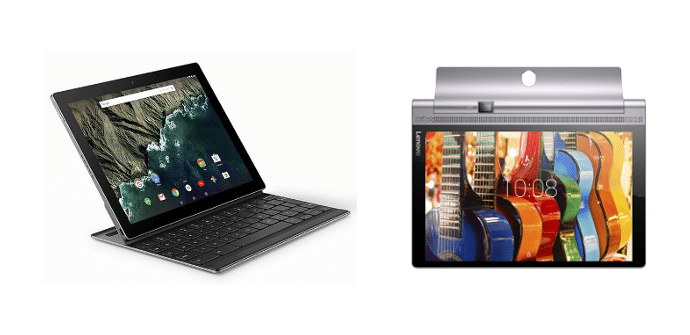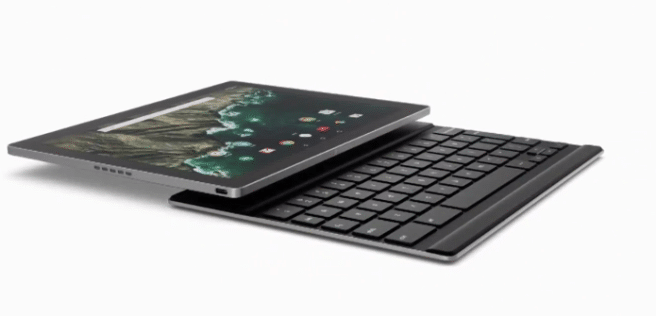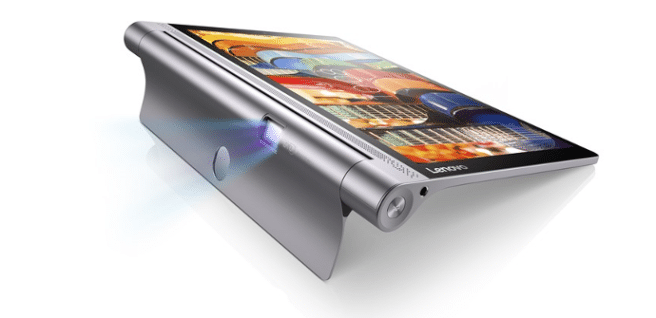
Although less popular than the iPad Air 2, the Galaxy Tab S2, the XperiaZ4 Tablet or the Surface 4, Lenovo (which after all is one of the heavyweights in the PC world) also has an interesting alternative to the new Pixel C, with some quite unique characteristics, in fact, for those looking for a tablet that can also help them at work, in addition to being quite close to the tablet of Google so much for Technical specifications as for price: the Yoga Tab 3 Pro. Can it really be worth betting on the tablet of the Asian company? We try to help you decide.
Integrated
La Yoga Tab 3 Pro always stands out in the design section for the unusualness of his, mainly due to that cylindrical base that not only helps us hold it more comfortably in the hands (it also has a tab on the back that helps us to do it when we leave it on the table) which houses a large capacity battery and, something even less common, a projector. In the case of Pixel CIts main attraction for professional use is its keyboard, but it must be remembered that it is sold separately. Both also offer us very good finishes, with a combination of leather and metal on the Lenovo tablet and an aluminum casing on the Lenovo tablet. Google.
Dimensions
In terms of size, it is surprising how close they are, even if we consider that their screens are almost identical (24,2x17,9 inch against 24,7x17,9 inch). The Pixel C has an advantage, however, when we compare its thickness (in theory it would overcome the Yoga Tab 3 Pro with 4,81 mm over the 7 mm of the tablet Google but keep in mind that they do not include the thickness of the support) and its weight (517 grams against 667 grams).

Screen
Very few differences are found in the screen section, being what really separates them the most is the fact that the Pixel C does not adopt the usual 16:10 aspect ratio, as does the Yoga Tab Pro, and that makes it slightly larger (10.2 inches against 10.1 inches) and also makes its resolution a bit different (2560 x 1800 against 2560 x 1600). The end result is that its pixel density is somewhat higher (PPI 308 against PPI 299).
Performance
While Google has opted for the latest processor Nvidia, Tegra X1 quad-core with a frequency of 1,9 GHz, on the tablet of Lenovo we find an Intel, also with four cores and with a frequency of 2,2 GHz. The Pixel C It has an advantage, on the other hand, in RAM memory (3 GB against 2 GB), in addition to having the plus of arriving already with Android Marshmallow and with the guarantee of fast and frequent updates.
Storage capacity
Although the basic model of both comes with 32 GB of storage capacity, the Yoga Tab 3 Pro has the advantage of having a card slot micro-SD, which gives us the possibility of extending it externally.

Cameras
If for some reason you are really going to use the cameras of your tablet frequently, you will surely be interested to know that the Yoga Tab 3 Pro It offers us more megapixels in both its main camera (13 MP against 8 MP) and its front camera (8 MP against 5 MP). In fact, you have to recognize the tablet from Lenovo that these are figures more typical of a smartphone in reality than of a tablet.
Autonomy
Once again we are forced to leave the autonomy section blank, since not only do we not yet have data from independent tests, something to be expected, but we also do not have the battery capacity of the Pixel C, something less common. It is true that the tablets of the range Yoga They are usually a difficult rival at this point, but we will have to wait to see if Google's manages or not to stand up to it.
Price
In this case, we do not find two tablets with similar prices, but tablets with an identical price: $500. We can therefore leave aside the cost considerations when choosing between the two.